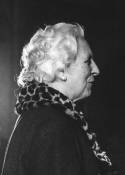
Gurdjieff International Review
Jeanne de Salzmann
1889–1990
Jeanne de Salzmann studied piano, composition, and orchestral conducting at the Conservatory of Geneva. Dancer and teacher of rhythmic movements, she was a pupil of Emile-Jaques Dalcroze who opened an avant-garde institute of the arts devoted to music, dance, and theater in Germany in 1912. During the Russian revolution, she and her husband Alexandre were living in Tiflis, Georgia, where she opened a school of dance and music. In 1919 the composer Thomas de Hartmann introduced the young couple to Gurdjieff.
In the years that followed, Jeanne de Salzmann became Gurdjieff’s devoted pupil, and remained with him until his death in 1949. For more than forty years thereafter, she worked tirelessly to transmit his teaching and to preserve the inner content and meaning of the Movements.
A conservatory trained pianist and student of Dalcroze, Jeanne de Salzmann (1889–1990) met Gurdjieff in 1919 and was his closest pupil until his death. She went on to lead and support the Gurdjieff Work in Paris, London, New York, and Caracas, with emphasis on the Movements.
With every sentence of this remarkable communication, we are brought directly in front of ourselves in a way that calls us to another level—wherein “it is in my essence that I reunite with that which sees.”
In this powerful communication, Jeanne de Salzmann states uncompromisingly that we have no measure with which to measure ourselves. “You must understand that all the other measures—talent, education, culture, genius—are changing measures, measures of detail. The only exact measure, the only unchanging, objective real measure is the measure of inner vision. I see—I see myself—by this, you have measured.”
Quotations of Jeanne de Salzmann on the subject of Gurdjieff’s Movements as recollected by her pupils.
Madame de Salzmann speaks of the group as “a special condition for exchange and a kind of conduit for higher influences... Real change of understanding would mean that, with the listener also questioning and the questioner really listening, the level of both participants would change.”
“I believe I need to pay attention when, in fact, I need to see and know my inattention.”
|
This webpage © 2020 Gurdjieff Electronic Publishing Photo by permission Gurdjieff Institute (Paris) Revision: March 1, 2020 |